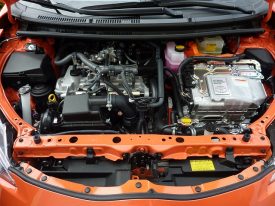Diesel cars are often seen as the superior products when compared to their regular gas counterparts. While this isn’t always the case, diesel’s generally possess a lot more power under the hood than we give them credit for.

They’re not just different in this regard, either. In terms of maintenance, repair and performance, they’re different beasts from gas engines entirely. So if you’re new to the diesel game, how can you extract the best possible performance from your vehicle?
Excellent question – and one this post will hopefully answer for you. The following are a collection of tips that are designed to help you coax the best performance from your diesel ride.
Put your foot down!
You may not believe it, but by speeding up, you can significantly improve the performance of your diesel car.
But how?
Most modern diesel engines, whether it’s cars, vans or RVs, come with a built-in filtering system. The filter helps to contain any harmful emissions and gasses. This system helps to keep the engine flowing smoothly, so it’s important that it’s looked after properly.
But here’s the kicker. These systems are designed to regulate themselves, but only when the car is traveling at high speeds. This means that your filter system will effectively clean itself, as long as your speed is up to a certain amount.
Failure to drive the car on a regular basis can have adverse effects on the engine, and can even clog these filters. Now I’m not encouraging reckless driving, but if you’re ever on a motorway or an open stretch of road? Use it to your advantage!
Don’t visit a jack-of-all-trades garage
The differences between diesel and gas engines are intricate, and that means diesel maintenance is whole other ball game. Similarly, the differences between Ford cars and Audi cars are vast, and each requires a different ability list and skillset. No two vehicles are the same, and that makes it hard to find a garage that would do the best job for yours in particular.
Fortunately, there are numerous solutions to these problems. There are plenty of garages and mechanics that excel in certain areas – e.g. BMW repair – and you should bear this in mind when choosing a mechanic to carry out repairs on your diesel engine.
For example, by using West End Diesel, diesel mechanic specialists, you could save yourself valuable time. Your general garage may not specialize in diesel engines, which could result in an inadequate repair job. Consequently, you’ll have to take your vehicle elsewhere anyway.
Plus, the better the repair shop is with diesel engines, the better the performance you’ll get out of the car. Diesel systems are far more complex than their traditional counterparts, and it takes a lot to get them right.
Switch up your fuel
Fuel is the stuff that keeps your car going, but it can also be the stuff that slows it down. Every time you fill up your car, the fuel can leave waste deposits on the inside of your tank walls. These deposits can build and build, having negative effects on the performance of your car.

This in mind, consider a switch to biodiesel to help halt these effects. Bio-diesel, as the name suggests, is a much cleaner, healthier, safer type of diesel fuel which can help to clean your tank.
Biodiesel can only be used in cars that have very few, or zero, modifications, so please bear this in mind. It’s not too widely available just yet, but it can be found at special biodiesel retailers. Or, you could try visiting a diesel garage.
Keep an eye on your glow plugs
Glow plugs are a standard feature of modern diesel engines, acting as a heating source that’s used to kickstart the system. As the name suggests, they ‘glow,’ emit heat and warm the engine through. This makes starting up the car much easier and smoother.
As such, they’re critical to the functioning of a healthy engine. Your engine is literally depending on heat, but without this heat, you won’t produce enough warmth to burn through fuel. That means if your glow plugs sustain damage, your car is all but unusable.
To stop this from happening, inspect your glow plugs as often as you can. They’re located in different places on different engines, so check your manufacturer’s guide. You can check them using a reliable multimeter, obtainable from most good hardware stores.
Alternatively, a garage can complete this checkup for you, and it will be part of your car’s yearly service. If you’re not too confident with vehicle maintenance, leave it to the professionals.


